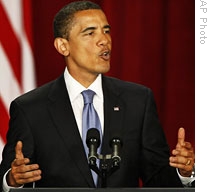
Obama’s Cairo university speech may not go down in history as one of the “great” foreign audience speeches a la Kennedy’ “ich bein eine Berliner,” or Reagan’s “tear down this wall.” In both of those speeches, the President of the United States was speaking to allies about enemies. Back then, the enemy was a government, an economic system, and political philosophy. Communism was what terrorism isn’t. It was a bureaucracy; a machine for oppression and tedium like the world had never seen. A joyless, anti-human, pig-headed method for organizing the absolute worst in the human psyche and channeling it into a belligerent mediocrity whose singular achievement was to make half the world fear them while making the other half go bankrupt.
But Obama’s task in Cairo required much more of a tightrope walk than either Kennedy or Reagan had to endure. America in Kennedy and Reagan’s time was much beloved the world over. We were the “good guys,” and we possessed a lifestyle and standard of living envied from Ankara to Zambia. For sure there dirty, criminal CIA schemes, political intrigue and the undermining of democracies in favor of friendly dictators, but these were the talking points of a liberal intellectuals and they had little play in the global public. News, even in the Regan 80s, took time to filter down through to the rank and file. And once those words reached the public’s consciousness, then tended to have a longer “mulling over” time; more time in the public sphere. But Obama, living and function in the 24 hour news cycle, gives a speech that is filtered, processed, quantified, assessed, and contextualized, within hours rather than days or weeks. The speech can be watched on youtube (along with Kennedy and Regan’s speeches), emailed, converted into an mp3 and parodied with a turnaround time that is all the more staggering in it is done without a discernable commercial interest. (Sort of like a blog!)
The president’s speech, though not one that is likely to quoted or included on a highlight reel, is perhaps more important than either of his two predecessors. His immediate audience want to like him as “Barack Obama: Superstar.” They love the celebrity, the charisma, and the symbolism of his presence. But as American president, feelings probably range from cynical dismissal, to outright resentment of the policies he is perceived as representing. A word that kept coming up in the Arab analysis of the speech is that America is seen as the chief source of all Arab humiliations since the beginning of the previous century. To be made humble is (at least according to the Arab pundits and journalists who spoke on the subject) is among the worst sins that could be committed against a person. Humility itself, however, is considered a high virtue in the Arab world. It suggests an acknowledgment of human frailty and fallibility. Thus, when Obama, in a stunning reversal of unspoken policy, admitted to America’s participation in the overthrow of the democratically-elected Mosaddeq, what Obama was really saying to Iran there are roots to this tension between our two nations, and here’s what I will own. Likewise, when the president rightly characterized the Iraq Was as “a war of choice,” he was admitting not so much to error, but to a reality that he acknowledges has caused havoc in the region.
Other signifying moments during the speech was Obama’s judicious use of quotations from the Koran. With the exception of Thomas Jefferson, Barack Obama may be the only president to take Islam seriously enough to study it and know what he is talking about. Obama found the most ecumenical , if not the most humanist, passages from that often shockingly obscure tome and used them to build a case for common ground. Here, that which was a liability during the campaign became a positive boon as only a man named Barack Hussein Obama, with his dark, not 100% African complexion, could plausibly say these words and somehow make them not sound trite or pandering. These were the sugared-spoonfuls that often bookended the more potent medicine of America’s standing by Israel, defending herself, and going after the co-religionists of the audience.
What this speech also does is affirm Obama’s willingness to treat his audience as adults. The Cairo speech is chapter in an ongoing discourse on the hard issues that began with candidate Obama’s speech on race, to his sober election night acceptance speech, and his recent commencement speech on abortion at Notre Dame. Obama is unwilling to ignore the hard topics, and he is not interested in shying away from controversy in favor of happy talk. It is possible that his charisma and symbolism are so self-evident that can carry him through these awkward and often intractable issues. His awareness of this aspect of his personality may allow him to some extent, forget about them, and simply read his speech and let the words do their job. Whether or not this is a sustainable strategy remains to be seen. Reagan managed it for eight years. Clinton’s own capacities turned to a kind of smarmy glibness towards the end. The people, here and abroad, may tire of this man of charm and equanimity before his policies are in place. But given the ability of the president and his administration to anticipate these angles and to think non-linearly, I would tend to think that there is even a speech on that dicey subject being written as we speak .
No comments:
Post a Comment